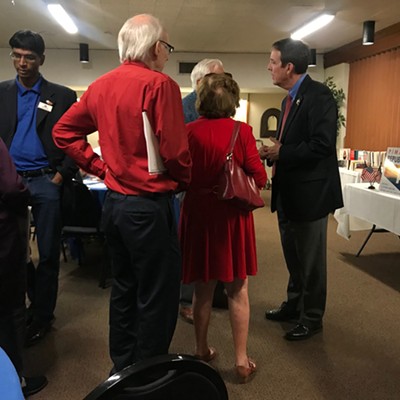Medina doesn't waste any time before laying into Grijalva when he's asked why he wants the District 5 seat on the Pima County Board of Supervisors.
"I think it is time for a change," Medina says slowly and carefully. "What happens with time--and what has happened with my opponent--is you tend to get complacent. I think in some aspects he's lost touch with his constituents and I think it's time that we have a person who's in there (who) is going to listen, digest and act upon the issues that deal with District 5, as well as the county as a whole."
Call it Grijalva Fatigue. Medina is hoping familiarity will breed contempt among District 5 Democrats, who have supported the incumbent through three terms.
"The difficulty I've found in this race is the tone," says Grijalva. "We're not debating issues, we're debating Raúl. And is he a good person, is he a bad person. It's sad. It's, 'He's been there too long.' So the issue is not the issues, the issue becomes Raúl."
"I don't feel the issue is him," Medina retorts. "It's part of what has to be addressed, but I don't think the issue is Raúl."
Reminded that he started an interview by saying Grijalva has grown too unresponsive during his years in office, Medina says with a smile that he's just repeating a common complaint he's heard on the campaign trail. It's "not necessarily" an attack on Grijalva.
But there's really no denying that the race is about Grijalva. Medina frequently complains that his opponent has been in office too long. He says he hears from people who say Grijalva doesn't return calls or show up at events he's promised to attend. Pressed for specifics, Medina complains that Grijalva doesn't have a direct line into his office. "Most of the supervisors have a direct line," Medina says. "He chooses to put his calls through the switchboard. Calls get lost, people get frustrated, it's just not being in touch with his constituency."
If he survives the primary, Grijalva will face a challenge from Republican Rosalie López that's shaping up to be far more personal. López, who won a seat on the TUSD board less than two years ago (a job she intends to keep even if elected to the Board of Supes), has already commissioned a poll of District 5 residents that dredged up Grijalva's 15-year-old DUI conviction. (The bad news for López: Even when the pollsters identified Grijalva as a tax-raising criminal, she still only got 50 percent of the vote.)
The 52-year-old supervisor has made his share of enemies over the last three terms in office, primary among them the Growth Lobby. Grijalva has long pushed for tougher development regulation and opposed many rezonings. In recent years, his office has worked closely with environmental activists, including staffers at the controversial Center for Biological Diversity, in the development of the Sonoran Desert Conservation Plan.
Grijalva got his start in politics as a student activist in the Chicano civil rights movement. His first public office was on the Tucson Unified School District Governing Board, where he served three terms. In 1988, he won his first term on the Board of Supervisors in District 5, which ranges from impoverished pockets on the south side to the tony Sam Hughes neighborhood. It's a heavily Democratic district, with nearly 31,000 Democrats, just under 13,000 Republicans, and about 10,300 voters who aren't registered with either party.
Like Grijalva, Medina has deep roots in the community. A native Tucsonan, Medina started working at his uncle George Medina's service station on Main and Speedway when he was 12. Uncle George is now chairing his campaign.
"One thing you can say about the automotive industry: Once you grow up around it and it's in your blood, it's in your blood forever," says Medina.
Almost eight years ago, Medina took a job working for auto dealer Jim Click. He's now a manager with the fleet service department. The hours are flexible enough that he can hold down the job while taking time to campaign for the District 5 seat.
Medina claims broad-based support for his campaign, but he's less than forthcoming about who's working the inner circle.
"You know what?" he says when asked to name names. "I don't think it's in my best interest that some of these people be named. Some of these people may be my opponent's friends. I don't like to put them in that situation."
But one political patron who's certainly no friend of Grijalva is Click, who sent out a fundraising letter on Medina's behalf in June. The results of that request won't be known until the end of the month, when the next campaign finance report is due. As of May 31, the date of the last filing, Medina had raised only $825, including $725 he'd loaned the campaign.
Medina's interest in politics dates back to his senior year at Tucson High. He's worked campaigns for former Tucson City Council members Rudy Bejarano and Ruben Romero, gubernatorial candidate Eddie Basha and former state Sen. Luis Gonzales (whose 1992 challenge to Grijalva came to an early end when a judge tossed Gonzales from the ballot because his petitions contained forgeries).
Medina's campaign has a conflicting message: He complains about the high taxes in Pima County, but seeks to increase spending on social programs for youth and the elderly, as well as pump more money into law enforcement. Ask him what gets cut to make that possible, and he admits he doesn't know. He proposes hiring an independent auditor to find the answer to that problem.
"I think one way we can alleviate this is to hire an internal independent auditor who is separate from the Board of Supervisors so we can oversee various issues, oversee the departments, and this independent auditor might cost us in the neighborhood of $150,000 to $200,000, but I think in the long run it might save us millions," he says. "Without getting a report from an independent auditor, you're hard-pressed to find where waste is, if there is any waste. It could be that what is being proposed to be spent is very justifiable, but at this point, it's hard to comprehend that, without having some form of accountability."
WHEN HE'S NOT leaving the hard decisions up to a future number-cruncher, Medina does take positions that put him at odds with Grijalva, particularly in the arena of land use.
Medina criticizes the county for failing to plan effectively, but it's a hard charge to make stick. For the last two years, county staffers have been working with a wide range of federal, state and local government officials, environmental activists, ranchers, real-estate representatives and others to develop the Sonoran Desert Conservation Plan, the most ambitious blueprint for the county's future ever undertaken. Grijalva has been a staunch supporter of the plan, working closely with the Coalition for Sonoran Desert Protection, a collection of conservation groups ranging from the Sierra Club to the Center for Biological Diversity.
Medina himself praises the plan, although he misses its central aim, which is to establish a streamlined policy relating to critical habitat, both for the endangered cactus ferruginous pygmy owl and other local species in danger of landing on the endangered species list. As the plan is developed with federal partners, the county will develop ways for developers to mitigate their impact on the pygmy owl habitat.
The critical habitat issue is lost on Medina, who suggests the county pursued the plan "probably because I would say they don't want to see Tucson and the surrounding area become another Maricopa County. I don't think anyone in Pima County really wants to see Tucson become another Phoenix metropolitan area."
Medina sharply differs with his opponent on the downzoning issue. In April of this year, Grijalva joined a unanimous vote by the Board of Supervisors to downzone 30 acres at Gates Pass and North Camino de Oeste. The zoning, passed in 1963, would have allowed a shopping center to be built at the intersection. Grijalva argues that the zoning is incompatible with the low-density housing that has developed in the area in the 37 years since the zoning was established.
The property's owner, Emmet McLoughlin, sued the county in July. The board had anticipated the suit as a way of testing a state law passed in 1998 forbidding downzoning. The supervisors had previously challenged the law, but the case was thrown out because the county had no pending downzoning cases.
Medina would have opposed the downzoning. "Naturally, I would have voted against it," he says. "If you're going to take someone's piece of property or change the value of someone's property, he needs to be compensated in some form ... . Because the one thing that we hold that continues to rise in value is your home and your land. For the most part, you don't find it to go down in value. It continues to go up in value. What you do when you downzone is you reduce the value of the land. So the owner needs to be compensated."
The biggest rezoning before the board in recent years was at Canoa Ranch near Green Valley, where Fairfield Homes wanted to build 6,100 homes, two golf courses, a hotel and commercial development.
Grijalva took the preservation of Canoa Ranch as a personal crusade. He joined the board in rejecting Fairfield's rezoning request in January 1999. Since then, the project has taken various twists and turns, including a lawsuit from the developer. County Administrator Chuck Huckelberry has been trying to work out a plan with Fairfield to allow construction of 2,000 homes, limit commercial and golf course development, and set aside 81 percent of the property as open space.
Although he supports Huckelberry's proposal, Medina criticizes the process for taking too long. "The problem stems with the decision process of the Board of Supervisors," he says. "Here we are, four or five years later, we still haven't resolved the Canoa plan."
Grijalva says the situation hasn't been resolved because the board didn't roll over for the developer. The strong stance forced the developer to compromise--a process that takes time.
How would Medina have done things differently? "I would have brought everybody to the table, listened, digested, and acted upon," he says. But he sidesteps the question of whether he would have voted to approve Canoa's original rezoning.
FOUR YEARS AGO, Grijalva won the Democratic primary with 77 percent of the vote against Susan Chambers-Casteloes, a political newcomer who ran a clumsy campaign.
Medina can expect to hang onto that 23 percent of Democrats who dislike Grijalva. And he can likely build upon it with a well-organized campaign. He has deep roots in District 5 and, if Click's fundraising appeal did the job that's expected, he should have enough money to reach out to voters. But Medina will still have to move a lot of voters to unseat Grijalva, although he may succeed in driving up Grijalva's negative rating as he prepares to face López in the general election.
The lingering question: Will an independent campaign committee target Grijalva? Rumors of such a committee have been circulating for months, but no campaign committee has filed organizational papers.
"I find it interesting that nobody else is getting the same kind of intense opposition that I'm getting," Grijalva says. "I think that's a mark of effectiveness."
Grijalva says he's been targeted by developers who hope to deal a setback to the environmental community by taking him out.
"My primary opponent is a surrogate and my general opponent is--I haven't figured out what that is, yet," he says.














